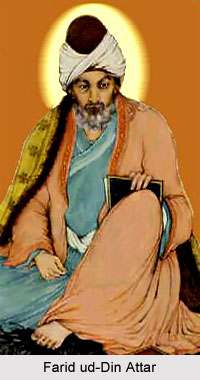 Farid ud-Din Attar is considered to be one of the greatest classical Sufi authors and literacy masters of the twelfth century. He had a great influence on his following Sufi authors and especially Jalaluddin Rumi was highly influenced by Attar. Farid ud-Din Attar was born in Nishapur, located in the north-eastern side of Iran and though there are some confusion about his exact timing of living, people believe that he lived for 100 years. As he was born in Nishapur, Farid ud-Din Attar is also popularly known as the Attar of Nishapur. Attar started his search for philosophical enlightenment at a very young age, when he went on pilgrimage to the holy place of Mecca. He also had an extensive travel throughout the area that includes the countries like Egypt, Damascus and India, before he finally returned to his home city.
Farid ud-Din Attar is considered to be one of the greatest classical Sufi authors and literacy masters of the twelfth century. He had a great influence on his following Sufi authors and especially Jalaluddin Rumi was highly influenced by Attar. Farid ud-Din Attar was born in Nishapur, located in the north-eastern side of Iran and though there are some confusion about his exact timing of living, people believe that he lived for 100 years. As he was born in Nishapur, Farid ud-Din Attar is also popularly known as the Attar of Nishapur. Attar started his search for philosophical enlightenment at a very young age, when he went on pilgrimage to the holy place of Mecca. He also had an extensive travel throughout the area that includes the countries like Egypt, Damascus and India, before he finally returned to his home city.
Farid ud-Din Attar followed the path of poetry for spreading his message to the common men, just like the other famous classical Sufi author, Omar Khayyam. Farid ud-Din Attar wrote a large number of 114 books throughout his entire life, however, most of them are not available at the moment. There are around thirty works of Attar that can be found and among them, the book named "Mantic at-Tayr" (The Parliament of the Birds) is one of the most notable ones. Attar described a group of birds (symbolised the individual human souls) under the leadership of a hoopoe (symbolised spiritual master), in this collection. He described the birds to be in search for the legendary Simurgh bird (or the God). Attar actually taught the people an esoteric teaching on the presence of the Divine within them, through this tale. He also sketched the individual phases in human consciousness, though he represented them as happening to different individuals or to a whole community. Apart from "The Parliament of the Birds", Attar`s other books like the "Sufic Divine Book" and the "Book of Counsel", are also well famous. In fact, Attar`s work helps to maintain the social fabric and ethical standards of Islam.
Farid ud-Din Attar has spread his own way of philosophical thoughts through his books to the people. Attar mainly dealt with the unawareness among the people of this world and said that they know nothing of themselves. He said that in such a state, they are like wax in the honeycomb and they can only get knowledge, when they get into the stage of the waxen candle and when light is emitted. Though he mainly followed the path of poetry, Attar`s followers used the means of illustrative biography, fables, maxims and apologues, for spreading his message further. All those works not only contain moral teaching but also some allegories that describe specific stages in human development. Farid ud-Din Attar also nicely used the theme of a `journey` or `quest` for comparing the successive stages of the human soul in search of perfection. Attar said that what seems to be absurdity and is not, is better than the ignorance of the man who thinks it is absurd. Another teaching of Attar was regarding light and he said that the true lover finds the light only if, like the candle, he is his own fuel, consuming himself.



















